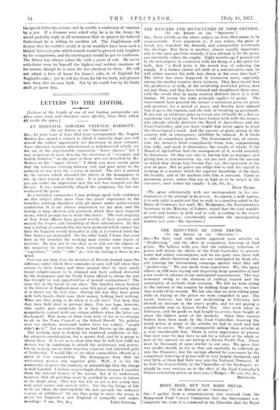LETTERS TO THE EDITOR.
[Leiters of the length of one of our leading paragraphs are often more read, and therefore more clinntinc, than those which fill treble the spare.] AN ESSENTIAL TOWARDS NATIONAL HARMONY. ITo THE EDITOR CP THE "SPECTATOR.")
Sin,—In your issue of June 23rd your correspondent Mr. Nugent Bankes has opened a subject to which I sincerely hope you will accord the fullest opportunity fur discussion in your columns. Your editorial footnote administered a well-deserved rebuke for his use of the objectionable expression " lower classes," but I was surprised at your denying the existence of "arrogant and foolish isolation " on the part of those who are described by Mr. Bankes as the " upper classes." I think you must sorely agree that the relations existing between rich and poor prior to the outbreak of war were the reverse of cordial. The fact is proved by the success which attended the efforts of the demagogues to stir up class hatred at that time. It is possible, however, that you are under the impression that the war has stamped out the disease. It has undoubtedly allayed the symptoms, but has not eradicated the germ.
As a battalion commander I may perhaps speak with confidence on this subject after more than two years' experience in the trenches, rubbing shoulders with all classes under active-service conditions* It is my intense admiration for my men, and the feeling of deep affection and gratitude which they have inspired in me, which prompt me to write this letter. The vast majority of New Army officers have proved worthy of their position and earned the respect and friendship of their subordinates. In illiS way a feeling of comradeship has been produced which cannot but have the happiest results hereafter if only it is fostered when the New Armies are disbanded. On the other hand, I know that even hero in the trenches the working man retains some traces of mistrust. lIe may not be too clear as to who are the objects of his suspicion—he describes them variously by such terms as "capitalists," " rich," " toffs," &c.—but the feeling is there in his mind.
Can any one deny that the destinies of Britain depend upon the influence under which these comrades of ours will fall when they return to their homes and their normal life?. Is their newly found enlightenment to be dimmed and their outlook distorted by the demagogue and the Trade Union official to whom the war has brought no real opportunities of mental readjustment? The issue lies in tine hands of one class. The families whose history is the history of England must seize this great opportunity when it is theirs for the last time. During the war they have given with both hands—their sons, their money, holding back nothing. What are they going to do when it is all over? You deny that they have held aloof in pre-war days. Can you hope, however, that under past conditions it is they who will come into sympathetic contact with our citizen soldiers when the latter are discharged? How many of them even went so far as to attempt to sit on the Town Council or the School Board? No, polities were too unclean, mnnicipal bodies were too vulg., "people didn't to it." Let us confess that we had thrown up the sponge. The working man is looking for improved conditions of life, for adequate consideration, for a square deal, and he is going to obtain these. It is for us to show him that be will best fulfil his desires, not by combining to attack the aristocracy and gentry, but by making use of their superior capacity and inherited gifts of leadership. I would like to see these commodities offered in a spirit of true comradeship. The demagogues deny that the aristocracy possess any superior gifts. Well, it is for the aristocracy to prove the contrary or acknowledge that the charge is well founded. I believe in privileged classes because I consider them the nature] lenders of the nation. Let it be understood, however, that all privilege must be justified by service in future or be swept away. This war has left us yet a few young men with great nannies and ancient titles. Are the big things of life to be for them the hunting-field, the polo ground—the ordinary routine of selfishness? Or are they going to enter the arena to strive for England—a new England of sympathy and under--


























 Previous page
Previous page